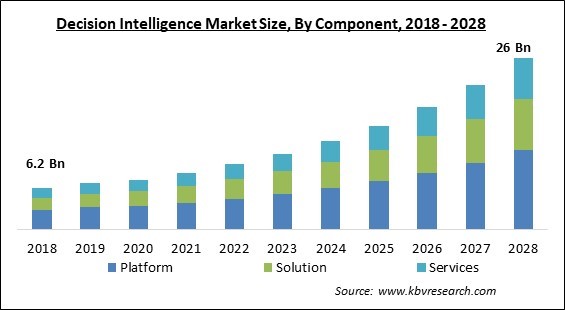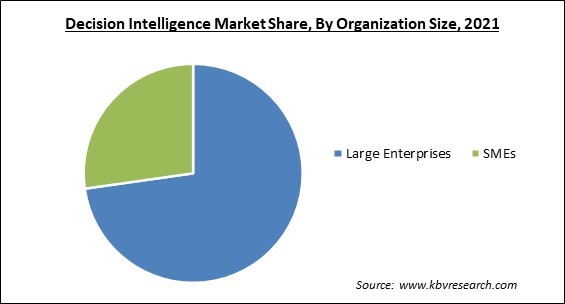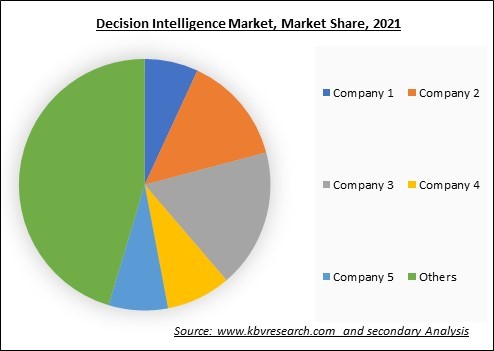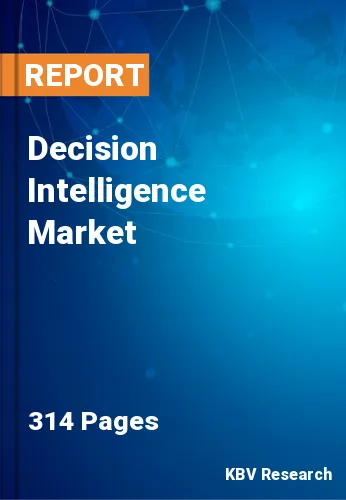The Global Decision Intelligence Market size is expected to reach $26 billion by 2028, rising at a market growth of 17.5% CAGR during the forecast period.
Decision Intelligence (DI) is the practical application of AI to every aspect of business decision-making. It is outcome-focused and has to meet business goals. As a result, decision intelligence is being used by businesses to optimize every function and boost productivity. Decision Intelligence allows businesses to leverage data and AI to quickly, accurately, and consistently decide how to proceed with various business demands and issues.

It enables data collection and machine learning modeling to forecast precise results for the best business decision-making. It gives businesses the ability to process and forecast data to make more educated decisions at every level of the organization, gain better visibility into their operations, and produce game-changing business results. Major factors anticipated to propel market revenue growth during the forecast period include the requirement to make quick and precise decisions to assure better outcomes and an increasing need for multiple problem-solving solutions.
Going forward, it is anticipated that a major portion of the market revenue growth for decision intelligence will be driven by the growing need to reduce specific risks related to human decision-making. However, decision intelligence technology can assist in addressing and alleviating poor human decision-making through the processing and analysis of data arrays, the making of intelligent predictions based on historical data, and the more accurate suggestion of the best possible decisions from inputs, that can then be utilized to estimate error-free decisions.
There are numerous strategies to solve organizational issues. Even if one of the parameters is altered, these solutions can be flexible and emphasize more than one result of a certain choice. As a result, numerous solutions are developed, assisting a corporation in achieving its goals. As a result, decision intelligence technology is favored by many businesses because it saves time that would otherwise be wasted on human decisions based on sparse data. The technology also uses a variety of data sources to foresee an intelligent solution, which is anticipated to accelerate market growth throughout the forecast period.
While the COVID-19 pandemic has had a negative impact on several industries, it has had a positive impact on the market for decision intelligence. Many companies and organizations had to close their doors to stop the deadly coronavirus from spreading. During this period, many businesses switched to using intelligence software to simply and remotely monitor the workflow and make better judgments. By beginning with a decision and the business problem it is intended to solve, decision intelligence sets itself apart from other analytical methodologies. From there, it looks for relevant data to the decision and problem. These factors have sped up the market's expansion during the crisis.
These industries have a pressing demand for precise decision-making. By examining the data gathered from various sources, providers have been able to better comprehend client perceptions due to the development and application of ML and AI. Businesses now prioritize providing a consistent customer experience throughout all channels and delivering offers in real-time by examining consumer purchasing trends. This is predicted to contribute to the market growth during the projection period.
Decision intelligence is a fast-growing area of artificial intelligence and data science. Many tasks connected to decision intelligence-related software, like morphological and syntactic analysis, have been solved and integrated that are utilized on the internet. Large Data analytics and decision intelligence can be combined to create robust systems that can handle big data at enormous scales, do text analysis & opinion mining, and support management and business decision-making.
A decision-maker finds it difficult to ignore unimportant information when it is present, though. It is true that organizations use decision support systems (DSS) to facilitate and accelerate routine choices. Some decision-makers tend to refuse to utilize their own discretion and to depend too heavily on automated decision-making. Undoubtedly, the emphasis has shifted, and because DSS is used so frequently, decision-makers may not be able to advance their abilities. These factors are therefore impeding the expansion of the decision intelligence market.
Based on component, the decision intelligence market is segmented into platform, solutions, and services. The solution segment garnered a significant revenue share in the decision intelligence market in 2021. Businesses can automate administrative processes, increase productivity, and save costs using decision intelligence technologies. DI may transform a system that tells users which device is most likely to fail into one that guides them in selecting the best course of action for the best possible business results.

Based on deployment, the decision intelligence market is segmented into cloud and on-premises. In 2021, the cloud segment witnessed the largest revenue share in the decision intelligence market. This is because cloud-based AI services are the ideal option for many enterprises. Instead of building a massive data center, companies can use the infrastructure already in place to access enterprises. In reality, one of the reasons AI has become so commonplace is the availability of multiple plug-and-play AI cloud services via cloud providers, in addition, to access to appropriate, pre-trained models to build AI applications. These elements are propelling the cloud segment's expansion in the decision intelligence market.
Based on organization size, the decision intelligence market is segmented into large enterprises and small & medium enterprises. In 2021, the large enterprise segment generated the maximum revenue share in the decision intelligence market. A growing number of businesses are using artificial intelligence to aid in decision-making. Because AI can process enormous volumes of data employing algorithms and processing power, its advantages increase with decision complexity. These AI technologies are being used by more and more businesses to aid in decision-making.
Based on vertical, the decision intelligence market is segmented into BFSI, retail & eCommerce, government & defense, healthcare & life Sciences, manufacturing, telecom, IT & ITeS, energy & utilities, transportation & logistics, and other verticals. The healthcare segment projected a prominent revenue share in the decision intelligence market in 2021. The healthcare sector is offering more prospects for growth in the decision intelligence industry. As innovative analytics techniques grow more precise and applicable to a wide range of tasks, AI has captured the attention of the healthcare sector.
| Report Attribute | Details |
|---|---|
| Market size value in 2021 | USD 8.6 Billion |
| Market size forecast in 2028 | USD 26 Billion |
| Base Year | 2021 |
| Historical Period | 2018 to 2020 |
| Forecast Period | 2022 to 2028 |
| Revenue Growth Rate | CAGR of 17.5% from 2022 to 2028 |
| Number of Pages | 314 |
| Number of Tables | 560 |
| Report coverage | Market Trends, Revenue Estimation and Forecast, Segmentation Analysis, Regional and Country Breakdown, Market Share Analysis, Companies Strategic Developments, Company Profiling |
| Segments covered | Component, Deployment, Organization Size, Vertical, Region |
| Country scope | US, Canada, Mexico, Germany, UK, France, Russia, Spain, Italy, China, Japan, India, South Korea, Singapore, Malaysia, Brazil, Argentina, UAE, Saudi Arabia, South Africa, Nigeria |
| Growth Drivers |
|
| Restraints |
|
Based on Region, the Decision Intelligence Market is segmented into North America, Europe, Asia Pacific, and LAMEA. In 2021, the North America region led the decision intelligence market by generating the highest revenue share. Due to the widespread deployment of these technologies in developed countries like the US and Canada across numerous industrial sectors, decision intelligence is growing in this region. Due to increased costs associated with the research and development process, the region is likely to grow more quickly throughout the estimated period of time. It is projected that the decision intelligence market will continue to grow due to the industry's rising regional player base. Additionally, it is anticipated that leading vendors will increase their investments in product development and business expansion, supporting the industry.
Free Valuable Insights: Global Decision Intelligence Market size to reach USD 26 Billion by 2028

The leading players in the market are competing with diverse innovative offerings to remain competitive in the market. The below illustration shows the percentage of revenue shared by some of the leading companies in the market. The leading players of the market are adopting various strategies in order to cater demand coming from the different industries. The key developmental strategies in the market are Acquisitions, and Partnerships & Collaborations.
The market research report covers the analysis of key stake holders of the market. Key companies profiled in the report include Oracle Corporation, IBM Corporation, Microsoft Corporation, Intel Corporation, Google LLC (Alphabet Inc.), Domo, Inc., Board International S.A., Provenir, Pyramid Analytics BV, and H2O.ai, Inc.
By Deployment
By Component
By Organization Size
By Vertical
By Geography
The global Decision Intelligence Market size is expected to reach $26 billion by 2028.
The emergence of ML and ai is enabling a variety of sectors to fully utilize decision intelligence are driving the market in coming years, however, Excessive information and reliance on decision-support systems restraints the growth of the market.
Oracle Corporation, IBM Corporation, Microsoft Corporation, Intel Corporation, Google LLC (Alphabet Inc.), Domo, Inc., Board International S.A., Provenir, Pyramid Analytics BV, and H2O.ai, Inc.
The Platform segment acquired maximum revenue share in the Global Decision Intelligence Market by Component in 2021 thereby, achieving a market value of $12 billion by 2028.
The BFSI segment is leading the Global Decision Intelligence Market by Vertical in 2021 thereby, achieving a market value of $5.5 billion by 2028.
The North America market dominated the Global Decision Intelligence Market by Region in 2021, and would continue to be a dominant market till 2028; thereby, achieving a market value of $9.5 billion by 2028.
Our team of dedicated experts can provide you with attractive expansion opportunities for your business.

